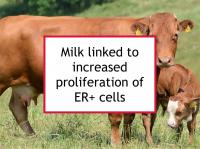A new Danish study has reported that milk promotes proliferation of hormone receptor positive breast cancer cells. Dietary estrogens may play a role in the development of hormone-dependent cancers such as breast cancer. Milk produced for human consumption typically is produced by pregnant cows.
Cow's milk contains both endogenous estrogens and phytoestrogens from soy feed that potentially contribute to an estrogenic effect of milk in consumers.
To conduct the study, the authors evaluated the effect of whey (the liquid left after curds are separated from milk) on proliferation of ER+/PR+ MCF-7 human breast cancer cells. Milk samples were obtained from 22 cows at different stages of pregnancy (first and second half) and whey was produced from the milk. The cell culture medium was augmented with 0.1%, 0.25% or 0.5% whey for six days, after which cell proliferation was evaluated.
Whey was found to induce significant proliferation of the breast cancer cells at all concentrations tested compared to cells with no added whey. No differences in the proliferative effect of whey were observed between samples from cows in the first half of pregnancy compared to the second half. No antiproliferative effects were found when whey was tested in the presence of estradiol in the medium. The authors conclude that whey, irrespective of the pregnancy stage from which the milk was obtained, induced a significant proliferative response in MCF-7 cells and no antiproliferative effect. These results may be caused, at least in part, by estrogens present in milk. The implications of the findings in relation to breast cancer will have to be studied further in other model systems, preferentially in animals.
Comments regarding the study
Milk consumption during childhood appears to protect against the development of breast cancer in adulthood. Milk is a source of important nutrients, including some that are have been associated with reduced breast cancer risk. For example, animal and laboratory studies have reported that conjugated linoleic acid (CLA), which is found in milk, protects against breast cancer development. However, milk consumption appears to promote breast cancer in adulthood.
Much of the milk we drink today is produced from pregnant cows, in which estrogen and progesterone levels are markedly elevated. The study results suggest that the estrogens in milk outweigh the effects of potentially beneficial components of milk. Please see our article on milk for more information.
